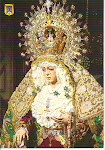Statement on the "Tridentine"
We fully welcome with respect and appreciation the recent Apostolic Letter of Pope Benedict XVI on the “Tridentine” Mass. It clarifies for us the status of the Tridentine Mass in the Latin Language.In accordance with the Apostolic Letter (“Motu proprio”) entitled “Summorum Pontificum” of Pope Benedict XVI, the celebration of the so-called Tridentine Mass, which is in the Latin language, as approved by Blessed Pope John XXIII in 1962 continues to be fully permissible as an extraordinary form of the Mass. The Tridentine Mass was never forbidden or abrogated.The so-called “New Mass” which was introduced after the Second Vatican Council and approved by Pope Paul VI in 1970 has become more popular among the people because it allowed the use of some approved adaptations, including the use of the popular languages and dialects. It became the ordinary form of the Mass, widely celebrated in the parish churches.When may the Tridentine (Latin) Mass be celebrated? According to the letter of Pope Benedict XVI, it may be celebrated by catholic priests of the Latin Rite: a) in private masses, b) in conventual or community mass in accordance with the specific statutes of the Congregation, c) in parishes upon request of the faithful and under the guidance of the bishop (in accordance with Canon 392). In such Masses, however, the readings may be given in the vernacular.This permission given by Pope Benedict XVI means that the Mass in Latin and in accordance with the formula of the Council of Trent, hence Tridentine, with the celebrant’s back to the faithful may be celebrated, as it was never forbidden or abrogated. For new priests, this will require formation in the Latin Mass.Now, we are instructed that in the liturgy of the Mass, there is the ordinary form which is that approved by Pope Paul VI in 1970 after the Vatican II; and there is the extraordinary form—the Tridentine (Latin) Mass which is that approved by Blessed Pope John XXIII in 1962. The two forms will have their way of leading the faithful to the true worship of God in prayer and liturgy; and may even be a factor for unity in the Church.+ANGEL N. LAGDAMEOArchbishop of JaroCBCP President
Monday, January 21, 2008
Subscribe to:
Post Comments (Atom)












No comments:
Post a Comment